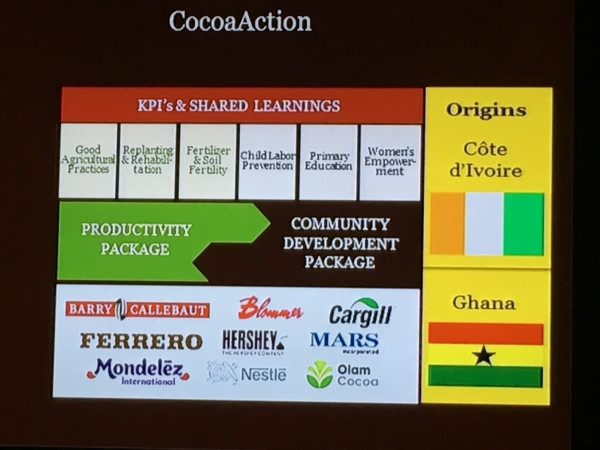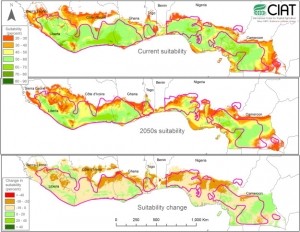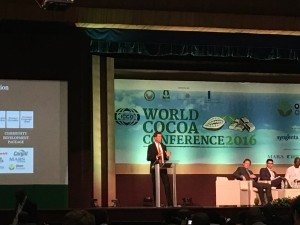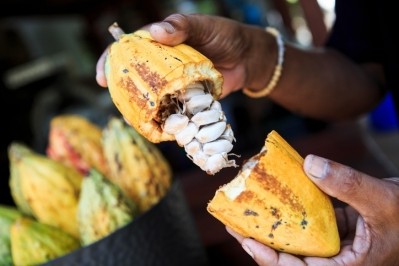Even doubled income for farmers won’t make cocoa sustainable: Mars

Speaking at the recent 2016 World Cocoa Conference, Barry Parkin – who is also chairman of the World Cocoa Foundation (WCF) – said industry initiative CocoaAction had provided a platform but needed to be scaled up.
Extending CocoaAction
The CocoaAction platform began in 2014 with nine of the largest chocolate and cocoa industry players pledging to reach 300,000 farmers in Côte D’Ivoire and Ghana by 2020.
Nine founding members of CocoaAction
Barry Callebaut, Blommer, Cargill, Ferrero, Hershey, Mars, , Mondelēz International, Nestlé, and Olam.
"We can double or more the yield, we can double the income - which is a good start - but it's not yet sustainable,” Parkin said on stage in the Dominican Republic.
"To get to sustainable we've got to triple or quadruple the income,” said the Mars sourcing boss. “That's the harsh reality... to get to a living income, a level where farmers are thriving, where the next generation want to be farmers, it’s a big big step."
The WCF has more than 100 members and now it hopes others beyond the nine founding members of CocoaAction will join the platform regardless of their cocoa volumes. It also hopes to expand to other countries while adapting to local conditions.
“Shame on us that we've taken so long to do this,” said Parkin. "We need to increase scale... clearly we've got to get to millions of farmers."

Higher farm gate prices?
A consortium of European civil society organizations that includes Oxfam, Solidaridad and the VOICE Network have called on the industry to help farmers earn a living income.
$0.80 a day
Cadbury's former head of cocoa sourcing recently estimated West African cocoa farmers were typically within the UNDP’s poverty scale, earning around 80 US cents a day.
The departing CEO of Fairtrade recently told this site chocolate makers must pay double the market price for cocoa farmers to receive a living income.
"We've got to solve that income gap,” said WCF chairman Barry Parkin at the World Cocoa Conference.
“That may certainly require further productivity, it may require higher farm gate prices and it may require alternative crops or larger land. All of those things will have to happen if we are going to solve this,” he said.
Further threats: Disease, climate change and deforestation
The Mars procurement chief said the need to scale up comes as cocoa faces strengthening headwinds.

“Cocoa swollen shoot virus is becoming more prevalent in West Africa and that's going to hurt and harm the cocoa crop,” he said.
Cocoa Swollen Shoot Virus Disease (CSSVD) has the potential to devastate production and farmer income, according to academic research. The current method to treat the disease is to cut out the infected tree.
Parkin also highlighted climate change as a serious threat. "All the models point to West Africa getting hotter and getting harder for cocoa,” he said.
An analysis published this month by the International Center for Tropical Agriculture (CIAT) predicts a 57% reduction in high climatic suitability areas in top cocoa producing nation Côte D’Iviore from present day to 2050.
"Deforestation is another issue that's alive in cocoa that we have to tackle,” said Parkin.
A paper last year in Tropical Conservation Science found three quarters of land in 23 protected areas surveyed in Cote D’Ivoire between 2010 and 2013 had been transformed for cocoa production, threatening endangered species.
"That all points to the fact we've got to accelerate our work,” said Parkin. "We've got these foundations... but we've got to build on that."
Training alone not enough

Nicko Debenham, Barry Callebaut vice president for global cocoa sustainability, said at the conference past efforts before CocoaAction were concentrated on numbers reached via training.
"There’s been a lot of effort put into farmer training on agronomy, but anywhere between 10-20% adoption rates. So historically you could say we've all been wasting a lot of money on farmer training,” he said.
He said Barry Callebaut was now focused on measuring the levels of adoption to ensure the effectiveness of training.
Parkin added: "Frankly, hundreds of thousands of farmers if not millions of farmers have been trained over the last 15 years. It's necessary but it's clearly insufficient on its own."
He said CocoaAcion also brought access to planting materials and fertilizer alongside the training element as well as community actions on child labor prevention and empowering women in cocoa to help strengthen the sector,
Business and morality
An audience member asked if industry truly cared for all farmers or was protecting its own interests. Why is it acting this way, he asked.
"The first is it's morally the right thing to do" said Parkin. "It's unacceptable to have poverty in our supply chains, it's unacceptable to have deforestation, it's unacceptable to have human rights issues."
He added there were "reputational issues" for the industry that were "not good for business".
"The third reason is we want to continue to grow our businesses and you can’t make chocolate without cocoa... We can only be successful as industry players if the farmers are successful,” he continued.
Barry Callebaut’s Debenham said: "It's about business, as much for the farmers as much as for the chocolate makers, the processors and governments... It's not sustainable if it's not about business.
"This is not about philanthropy, this is not about CSR, it's not old-fashioned CSR.
"We are not trying to do evil. We are trying to support farmers with significant increases in income to get them out of poverty to make their business case viable to therefore support our business case to be viable in the future,” he said.














